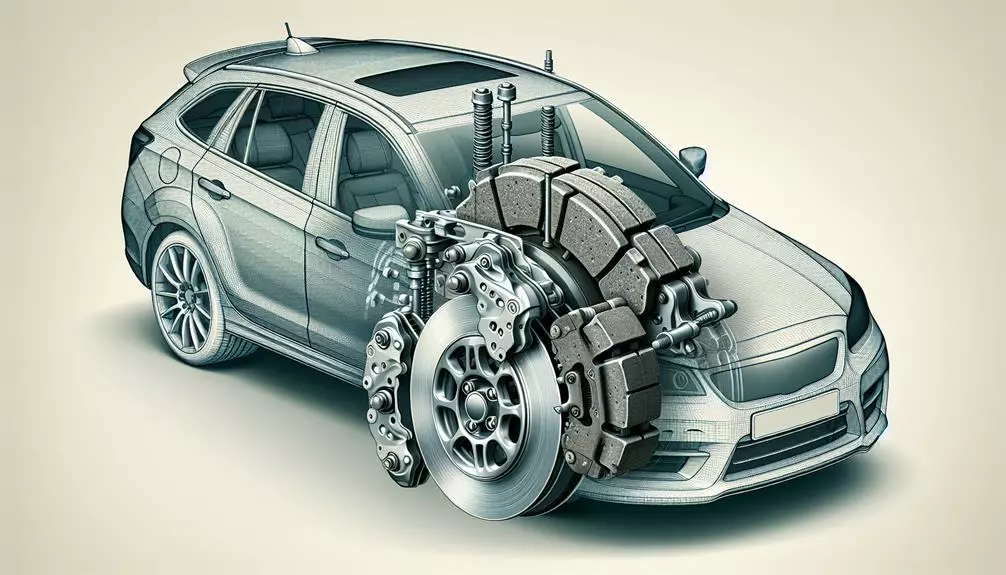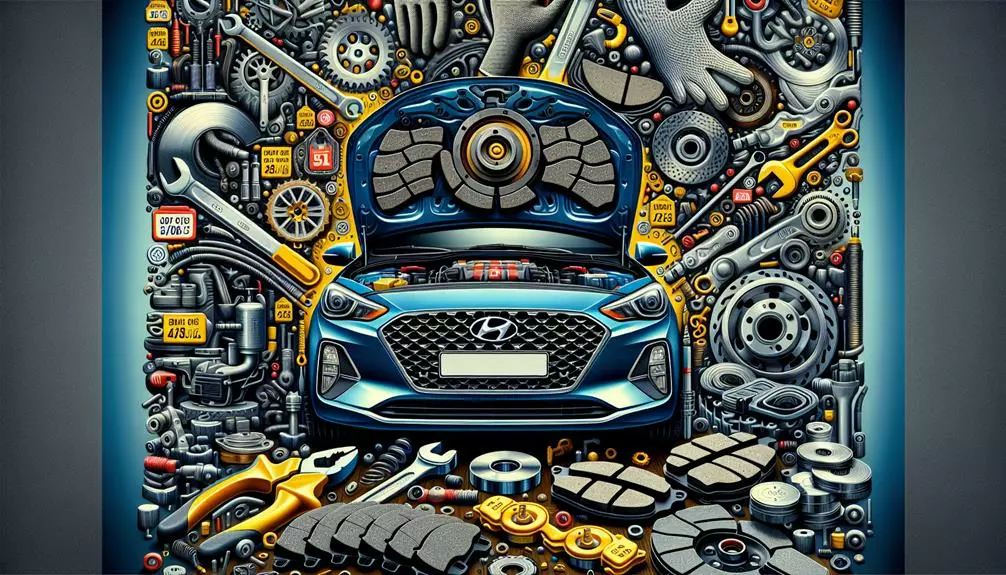The cost of replacing Hyundai i30 brake pads and discs varies due to several factors, including whether you opt for DIY or professional installation and the model year of your vehicle.
Navigating the waters of Hyundai i30 brake pad and disc replacement costs can feel like steering through a foggy sea—you know you need to reach your destination, but the path isn't clear.
You're probably wondering how much of your budget will be consumed by this necessary maintenance. Several factors can sway the total, from the choice between DIY and professional installation to the specific model year of your Hyundai i30.
Before you make any decisions, let's investigate what influences these costs and uncover some strategies for keeping them at bay, ensuring your journey doesn't end up costing more than anticipated.
Understanding Brake Pad and Disc Wear

To keep your Hyundai i30 running smoothly, it's crucial to get to grips with how brake pad and disc wear can affect your vehicle's performance. Brake pads and discs are critical components that guarantee your car stops when you need it to. Over time, they wear down because of friction every time you apply the brakes. Comprehending this wear is key to maintaining your car's safety and efficiency.
Brake pads are the initial to wear out. They're made of a friction material that presses against the brake discs to slow your car. You'll know they're wearing thin if you hear a squealing noise when you brake, or if your car takes longer to stop than usual. It's a sign you need to check them out.
Discs, on the other hand, wear out less frequently but still need attention. They can become grooved or warped over time, affecting brake performance and safety. If your steering wheel shakes when you brake, it's likely your discs are the culprit.
Regular checks are vital. Don't wait for the warning signs. By keeping an eye on the condition of your brake pads and discs, you'll not only guarantee your Hyundai i30 remains safe to drive but also avoid more costly repairs down the line. Remember, proactive maintenance is always better than reactive repairs. Your vehicle's manual will guide you on the recommended intervals for checking and replacing these components, but always listen to your car—it'll tell you when something's not right.
Average Costs for Hyundai I30
Maintaining your Hyundai i30's brakes, including both pad and disc replacements, typically costs between $300 and $500, depending on different factors like parts and labor. This range is a rough estimate that can help you budget for the inevitable maintenance that comes with car ownership. Remember, investing in timely brake maintenance can save you from more costly repairs down the line and make sure your vehicle remains safe to drive.
When you're setting aside money for maintenance, it's important to understand why these costs can add up. Here are some points to take into account:
- Quality of Parts: Higher-quality brake pads and discs may cost more upfront but tend to last longer and perform better, potentially saving you money and hassle in the long run.
- Labor Costs: Labor charges can vary significantly based on where you live and the service center you choose. Dealerships might charge more than independent shops, but they often offer specialized expertise.
- Frequency of Replacement: How often you need to replace your brakes can impact your annual maintenance budget. Driving habits and conditions play a big role in wear and tear.
- Safety and Performance: Investing in your car's braking system is investing in your safety and the overall performance of your vehicle. Don't compromise on quality to save a few bucks.
Understanding these aspects can help you make informed decisions about brake maintenance for your Hyundai i30, making sure you're never caught off guard by unexpected costs. Always prioritize safety and quality to keep your vehicle running smoothly and efficiently.
Factors Influencing Replacement Costs

Several factors can greatly influence the cost of replacing your Hyundai i30's brakes, from the type of parts you choose to the place where you get the service done.
To start off, the choice between OEM (Original Equipment Manufacturer) and aftermarket parts plays an important role. OEM parts generally offer a guarantee of quality and compatibility with your vehicle, but they can come at a higher price. Aftermarket options, on the other hand, might be less expensive but vary greatly in quality and performance. You'll need to balance your budget with your expectations for durability and functionality.
The model year of your Hyundai i30 also affects the price. Newer models might've more advanced braking systems that require specific, possibly more expensive, components. Moreover, if your car is equipped with features like electronic brake distribution or regenerative braking, expect to pay more for parts that are compatible with these technologies.
Your location is another vital factor. Labor costs for auto repair can differ significantly from one region to another. Urban areas, where the cost of living is higher, tend to have higher service charges compared to rural locations. Additionally, the availability of parts can vary, affecting both the price and the time it takes to get your vehicle back on the road.
To conclude, the condition of your brake system can impact the cost. If you've waited too long and your brakes have caused damage to other parts of the wheel assembly, you'll be looking at a higher bill because of the additional repairs needed.
DIY Vs. Professional Replacement
Deciding between DIY and having a professional replace your Hyundai i30's brakes hinges on several pivotal factors. The choice you make can have a major impact both on your wallet and your vehicle's safety. It's vital to weigh your options carefully before proceeding.
When considering DIY, the most obvious advantage is cost savings. You're basically cutting out the labor charges that a professional service would include. However, this upfront saving can be misleading. Here's why:
- *Skill Level*: Replacing brake pads and discs requires a certain level of mechanical skill. If you're not confident in your abilities, you might end up causing more damage, leading to higher costs down the line.
- *Time*: Time is money. If you have the free time and enjoy working on cars, DIY can be a rewarding project. But if you're squeezing this task into an already busy schedule, it mightn't be worth the hassle.
- *Tools*: Do you have the right tools? Some specialized tools are required for this job, and purchasing them can offset the savings on labor costs.
- *Warranty*: Professional installations often come with a warranty on both parts and labor. A DIY approach means you're on your own if something goes wrong shortly after the replacement.
Ultimately, the decision to go DIY or professional for your Hyundai i30's brake replacement boils down to balancing cost savings with the risks of potential future issues. Consider your skills, tools, time, and the value of a warranty before making your choice.
Tips for Extending Lifespan

Whether you choose DIY or a professional service for your Hyundai i30's brake replacement, knowing how to extend the lifespan of your brakes can save you time and money in the long run.
First, it's important to adopt smooth and gradual braking habits. Abrupt stops and hard braking put unnecessary strain on your brake pads and discs, causing them to wear out faster. Instead, anticipate stops and apply the brakes gently. This not only preserves your brake components but improves fuel efficiency.
Maintaining a reasonable speed, especially in heavy traffic or urban areas, can prevent the need for sudden braking. The faster you're going, the harder your brakes need to work to slow down the car, which accelerates wear. By keeping your speed in check, you'll reduce the need for forceful braking and extend the life of your brakes.
Regularly checking your brake fluid can also make a significant difference. Low or contaminated brake fluid can lead to brake system failure and increased wear on pads and discs. Make sure it's at the correct level and replace it according to your Hyundai i30's maintenance schedule.
Lastly, don't overlook the importance of periodic inspections. Getting your brakes checked by a professional can catch issues like uneven wear or minor damages before they turn into costly repairs. They can also recommend if any components need cleaning or adjustment, further extending the lifespan of your brakes.
Where to Find Affordable Parts
Finding affordable parts for your Hyundai i30's brake system doesn't have to be a challenge. With a bit of research and patience, you can find high-quality components that won't bankrupt you. Whether you're looking for brake pads, discs, or any other braking component, there are several avenues you can investigate.
To begin with, consider online auto parts stores. These platforms often offer competitive prices and a wide selection of parts. They also feature customer reviews, which can help you gauge the quality of the parts you're considering. Plus, many online stores offer periodic sales and discounts, so keep an eye out for those deals.
Next, don't overlook local auto parts shops. While prices might be slightly higher compared to online stores, you can benefit from immediate availability and the opportunity to physically inspect the parts before purchase. Additionally, the staff can offer valuable advice and insights based on your specific needs.
Thirdly, salvage yards can be a goldmine for finding affordable, gently used brake parts. It's a more environmentally friendly option and can save you a significant amount of money. However, be sure to inspect the parts thoroughly for wear and damage.
Lastly, consider aftermarket parts. They're often less expensive than OEM (Original Equipment Manufacturer) parts and can provide similar or even superior performance. Just make sure that you purchase from reputable brands to avoid compromising on quality.
Conclusion
In conclusion, you've learned that the cost of replacing brake pads and discs on your Hyundai i30 can vary widely. Factors like your driving habits, choice between DIY or professional services, and where you shop for parts play a big role.
Remember, investing a bit more in quality and professional installation can extend the lifespan of your brakes, saving you money in the long run. So, shop smart and drive safely to keep those costs in check.